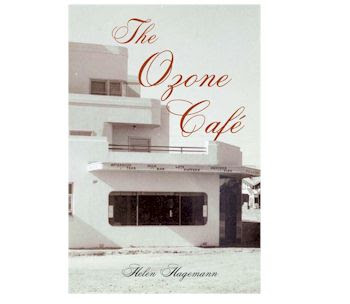The horses are green and scarred. We are gazing at Percy Wright's carousel seventy-odd years from its turning. Voices travel on radio waves, and we hear the volley of summer, think of women mingling at the water's edge, a lifeguard above our heads in a little yellow cap. We do not miss our town, as we walk along the jetty, climbing grass dunes scattered with firs. Carnival shouts, sounds of tent pegs, a horizon of mirrors. Horses with clumps of flaxen hair are strapped to a pole.
Leanne says, 'This is a great aperture for making art.'
'In Paris,' I say, Eugène Atget photographed a dying era as artifact: an organ grinder, satyrs, a brass carousel with bulls and decorative cups.'
We move on through myth, into the canvas of street fairs and sideshows, the freaks of carnival. This is their home, their location. Only they do not move, but when we pass they smile as the organ begins. In the background, the operator is lighting a cigarette, and his smoke merges into a distant factory's plume that disappears into tiny clouds above us. Young women languid on the carousel in silk-wraps and bathers clutch horses; some link arms as if on a Sunday stroll. We watch them laughing, placed there together, as if they are the rare smiles of our mothers and grandmothers arranged in sepia.
Out in the air, the pulse of trombones; the wind percussing through the scaffold of horse. The silky women slip like soap from saddles, rythmically lifting and lowering their buttocks around the gallopers. We laugh at their antics.
Leanne says, 'Soon they will raise their skirts above their knees and kick out a Charleston.'
1932, the day shifting like a seagull on Percy Wright's Carousel, a foreshore of miniature cars, hot dogs, Hoop-la, and fairy-floss. An aroma of hot tea and the smell of sawdust trail through the courtyard, and the women are still smiling. Their faces float past, and the music begins again.
I do want to be beside the seaside. Oh, I do want to be beside the sea.
The trees swoosh by, the grass beneath our feet, as we circuit a shooting gallery, dart-board, ice-cream van, a man juggling carnival toys. We sway, our heads cocked back, looking up at the sky, clanging our garish horses until the paint peels. The trumpets and cymbals falling soft as a mist on a bald mountain, carnival's razzle-dazzle diminished in the denuded light.
The women swing arms over a distant hill, and as we raise the tent-flap, the clouds couple at dusk; our bodies as shadows, silhouetted before us.
I say to Leanne, 'What did you enjoy the most?'
'Letting go of the red and green balloon,' she says, 'and how the rippled shoreline left holes at our feet.'























